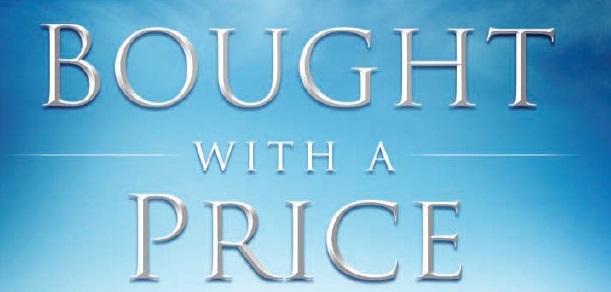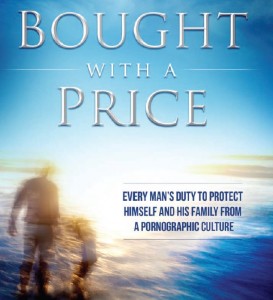Bought with a Price
March 9, 2014 by admin
Filed under Blog, cultural manliness, Faith, Fatherhood, For Women, manliness, pornography, Virtue
I am profoundly excited to bring you a great anti-pornography resource, a revised edition of a Pastoral Letter from Bishop Paul Loverde from the Diocese of Arlington, Virginia. This pastoral letter originally came out eight years ago, but has been reissued because of the severe and overwhelming need. “Bought with a Price” – Every Man’s Duty to Protect Himself and His Family from a Pornographic Culture. It includes a new foreword from anti-porn leader, Matt Fradd.
The intended re-release of this letter is March 19, 2014 – the Feast of St. Joseph, patron saint of fathers. I highly encourage everyone to read this letter and put what you read into action.
“Today’s father must protect himself and his children from the relentless assault of an increasingly pornographic culture; moreover, mothers share this sacred task. Every home now stands in the pathway of this attack on our children’s innocence and purity. If we are not vigilant, our sons and daughters will pay a steep and heartrending price.” p.6
Fathers – it is critical that we work to protect ourselves and our families from the evils of pornography. First, ourselves, and then those around us and under our care.
 In a future post, I will write on the topic of “helping parents protect their children from the internet” – a talk that I give about the harms of the internet and how to practically handle the situation. One of the most important aspects of this topic is to have conversations with our children. If you think that your child isn’t or won’t be affected by pornography, you are wrong. If your children have internet accessible devices and you don’t know that they can (and probably do) access pornography, you are naïve. How then do you handle this? You talk about it! And it’s never too early to talk about it… when done properly, prudently, and age-appropriately. (Note: the average age of first exposure to pornography in America is now 8 years old and dropping rapidly!)
In a future post, I will write on the topic of “helping parents protect their children from the internet” – a talk that I give about the harms of the internet and how to practically handle the situation. One of the most important aspects of this topic is to have conversations with our children. If you think that your child isn’t or won’t be affected by pornography, you are wrong. If your children have internet accessible devices and you don’t know that they can (and probably do) access pornography, you are naïve. How then do you handle this? You talk about it! And it’s never too early to talk about it… when done properly, prudently, and age-appropriately. (Note: the average age of first exposure to pornography in America is now 8 years old and dropping rapidly!)
Do you expect your child to understand mathematics on their own, with no instruction? What about anatomy, biology, history? Certainly not. The old adage, “having the sex talk” is a misnomer, implying that parents should only speak to their children one time about sex. Simply check a box and it’s handled. This does not work. We should instruct our children on a properly ordered understanding of sexuality, and instruct them often. I start imparting knowledge on the topic very early with my children… even before they can truly understand. It sets the tone, and creates a solid foundation for them to grow upon. As each child gets older, the topic broadens, the seriousness increases, and the formation I desire heavily to provide to my children is strengthened.
Take the time and read this pastoral letter from Bishop Loverde, then act on it!
TrueMan up!
Tuesdays With Daddy – Times Gone By
February 7, 2012 by admin
Filed under Blog, Fatherhood, manliness, Tuesdays with Daddy
A series of posts I used to write were called “Tuesdays with Daddy.” [They’re in the blog archives under the Fatherhood tab.] These posts were about my time at home, on Tuesdays, with my daughters. At the time, I had two toddler daughters that I was lucky enough to be able to spend special time with on Tuesdays. Today, I took the opportunity to stop working (I mostly work from home) and I went outside with them. It was a beautiful day and I figured it would do us all some good.
 Nowadays, it’s not just my two girls, I also have a one year old son, Dave Jr. He’s really awesome, and we had a great time outside today. (Maybe if I can get the video edited together quickly enough, I will post the video of him riding on his four-wheeler by himself! Yes folks, he turned 1 last week and can ride the thing by himself!) All three of them were all over our fields and sincerely enjoying the outdoors, the sunshine, and even the brisk breeze that was lightly blowing today. I was running around with them, laughing and joking, holding them and hugging them, throwing them in the air, pushing them on the tree swing, watching them on the four-wheeler, playing t-ball, helping them ride their bikes, and showing them the old tractors. What a way to rejuvenate!
Nowadays, it’s not just my two girls, I also have a one year old son, Dave Jr. He’s really awesome, and we had a great time outside today. (Maybe if I can get the video edited together quickly enough, I will post the video of him riding on his four-wheeler by himself! Yes folks, he turned 1 last week and can ride the thing by himself!) All three of them were all over our fields and sincerely enjoying the outdoors, the sunshine, and even the brisk breeze that was lightly blowing today. I was running around with them, laughing and joking, holding them and hugging them, throwing them in the air, pushing them on the tree swing, watching them on the four-wheeler, playing t-ball, helping them ride their bikes, and showing them the old tractors. What a way to rejuvenate!
When I came in the house, it was time to get back to work. When I sat back down at my computer, I was so filled with joy, it was almost hard to sit still. I took an hour out of my workday to be with the people who are the most important in my life. Not only will they remember it, I will remember it. Not only did it bring life to them today, it brought life to me today. What a blessing my children are to me.
hard to sit still. I took an hour out of my workday to be with the people who are the most important in my life. Not only will they remember it, I will remember it. Not only did it bring life to them today, it brought life to me today. What a blessing my children are to me.
If you’re a father, and you’re like me, you often get bogged down in the “stuff that has to get done.” Work, helping your wife, chores around the house, helping your wife, this meeting and that meeting, taking care of the vehicles, oh yeah don’t forget prayer, helping your wife, going to the bank, making money, helping your wife… on and on. The “stuff” never stops. But without a doubt, your kids grow up more and more each day. Every once and a while, just drop what you’re doing and take your kids outside. If your kids are anything like mine, and they probably are, they really don’t care what they get to do with Daddy, they just know that they get to be with Daddy! Don’t let another day go by without spending this invaluable time with your kids.
Last thing… I have been really frustrated lately. I plan to write more on this in a coming post. My frustration stems from things that I see in our society, in the government, the 2012 presidential election, things that are happening in and to the Church and so on. I have to remember, and ask you to consider, this… our world isn’t doomed. Our world is set for joy, as long as we teach our kids how to live joyfully. Once we and those who die before us are gone, our kids are in charge. If they know how to live with joy, our world will be just fine.
TrueMan up!
A TrueMan’s Marriage
 I just learned that February 7-14 is National Marriage Week. I guess it’s fitting, with Valentine’s Day and all those commercialized red hearts. Sort of cliche, if you ask me. But, nonetheless, it is a real thing. Even the US Catholic Bishops are behind this. I’m putting this out now, a few days ahead, so you can get thinking, planning, and doing!
I just learned that February 7-14 is National Marriage Week. I guess it’s fitting, with Valentine’s Day and all those commercialized red hearts. Sort of cliche, if you ask me. But, nonetheless, it is a real thing. Even the US Catholic Bishops are behind this. I’m putting this out now, a few days ahead, so you can get thinking, planning, and doing!
I’m all for marriage. It is an incredible blessing to be a married man. It challenges me, no doubt… but at the end of the day, and hopefully at the end of my life, I will be sanctified because of it. There’s really nothing like giving your whole self to someone else for your entirety here on earth. Something to ponder, for sure.
To consider where you are with things in your marriage, or if you aren’t married, to maybe consider what you want in your future marriage, here’s a blurb from the USCCB website on National Marriage Week:
 February: A Time To Celebrate Love And Marriage
February: A Time To Celebrate Love And Marriage
It’s the month of romance! Here are a couple February events to celebrate love and marriage:
“Let’s Strengthen Marriage” is the theme of National Marriage Week, Feb. 7-14, 2012. National Marriage Week, now in its third year, is a collaborative effort to promote marriage as a benefit to husbands, wives and the community, as well as the best environment in which to raise children. Resources for couples and organizations who want to promote marriage are available on the website.
World Marriage Day will be observed on Sunday, February 12. For more than 30 years this Day has been promoted by Worldwide Marriage Encounter. If you’re looking for resources that your parish can use to celebrate World Marriage Day, check out the WWME website.
In honor of National Marriage Week and World Marriage Day, here are three FAQs that the website frequently responds to.
(1) We just got engaged. Do you have any suggestions for tools that can help us to deepen our relationship?
First, congratulations on your upcoming marriage! Try starting with the Personality Audit. It’s a great way to understand yourself and your fiance(e) better. Family of origin issues arise in many marriages. Take the Family of Origin exercise to discover how your experiences growing up were similar or different. Most of us tend to avoid topics that are sensitive, or where we think we might disagree with our spouse or fiance(e). Here are some ideas for those “Must-Have Conversations” on such topics as intimacy, finances, and commitment.
(2) How can we find a marriage education or marriage enrichment class in our area?
Many organizations—religious and others—offer programs to help couples improve their marital skills. These classes can cover everything from communication and conflict resolution to budgeting and time management. To find a program in your area, try starting with the Smart Marriages directory of programs. Also check out the list of classes on the National Marriage Week website.
Another possibility is to contact your diocesan Family Life Office. For contact information, go to the Family Life Office locator on the homepage. Finally, many couples at all stages of marriage have benefitted from a Marriage Encounter weekend. For information go to the Worldwide Marriage Encounter website.
(3) My spouse and I are experiencing problems in our marriage. Where can we go for help?
First of all, check out the article “Finding Help When Your Marriage in Trouble.” It explains a range of options for couples who are experiencing marital difficulties. If you’re looking for a counselor, try asking your pastor or parish staff member for a recommendation. Many parishes maintain lists of counselors who deal with various issues. The counselor should have specific training and experience in marriage counseling. Many diocesan Catholic Charities offices offer counseling or can refer you. Contact information for Catholic Charities is usually available on the diocesan website.
Couples with serious problems may consider making a Retrouvaille weekend. Retrouvaille has a solid record of bringing couples back from the brink of divorce. Information about local Retrouvaille weekends is available on their website.
TrueMan up!
Weddings Are About The Marriage
A few weeks ago, a colleague and great friend began his marriage. The Nuptial Mass was beautiful and the party was lots of fun. This weekend, some other longtime (and very special) friends are celebrating the start of their marriage. We (my wife and I) couldn’t be more happy for these couples. We know how incredible marriage can be and pray for only the best for these and all couples as they start into their vocation of marriage.
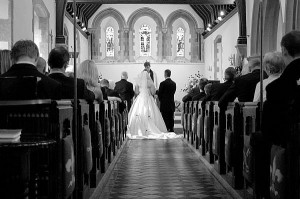 Often times, the wedding events can get the better of a couple and the point and purpose is lost in the colors, the flowers, the cake and the music – among a slew of about a million other ‘details’. We experienced this in our wedding preparations, to some extent, and know that it is a temptation for most couples. To keep it all in perspective… the wedding is all about the marriage. The marriage is all about sanctification! To be one with your helpmate and to help her get to Heaven. To be blessed (if it be God’s will) with children and to help them get to Heaven.
Often times, the wedding events can get the better of a couple and the point and purpose is lost in the colors, the flowers, the cake and the music – among a slew of about a million other ‘details’. We experienced this in our wedding preparations, to some extent, and know that it is a temptation for most couples. To keep it all in perspective… the wedding is all about the marriage. The marriage is all about sanctification! To be one with your helpmate and to help her get to Heaven. To be blessed (if it be God’s will) with children and to help them get to Heaven.
A topic that I am convicted by is, as many of you have read before, my saying “Make the Choice to Love.” It is so necessary and, in my estimation, the only way to give yourself fully to your spouse – by making the loving choice 100% of the time. Below is a previous article that I wrote for iibloom.com called “The Choice to Love.” I hope you like it and I hope it is helpful.
“Early in our marriage, my wife would ask me, in a somewhat sarcastic tone, “Are you making the choice to love right now?” It would stop me dead in my tracks to realize that I wasn’t. I like to think of myself as having a strong head on my shoulders and an ability to admit when I’m wrong. When my wife would ask that question, I knew that, in fact, I wasn’t making the choice to love and that I was dead wrong. I was not giving my wife the love and respect that she deserved. I took the unity that we had promised to one another in our wedding vows and I shattered it, so that I could be right. My need to be right was why I would argue. I would argue because I was stubborn. I was stubborn because I was self-centered. Notice that each of these scenarios contains choice and action. Instead of needing to be right, I should compromise and come to a common-ground understanding. Instead of arguing, I should suck up my pride and admit to my portion of the wrong doings and never, under any circumstances, should I place blame. (Placing blame activates defense mechanisms. Once defense mechanisms have been activated, good luck coming to the before mentioned common-ground understanding.) Instead of being stubborn, I should be humble. Instead of being self-centered, I should be marriage centered. I should make the choice to love.
choice and action. Instead of needing to be right, I should compromise and come to a common-ground understanding. Instead of arguing, I should suck up my pride and admit to my portion of the wrong doings and never, under any circumstances, should I place blame. (Placing blame activates defense mechanisms. Once defense mechanisms have been activated, good luck coming to the before mentioned common-ground understanding.) Instead of being stubborn, I should be humble. Instead of being self-centered, I should be marriage centered. I should make the choice to love.
If I always make the choice to love, I am making the decision that will best allow my marriage to grow and succeed. Love is a verb and requires action. The choice to love removes selfishness, pride and arrogance. Making the choice to love means and assures me that:
1. I am making the best decision for my marriage.
2. I am making the best decision for my spouse.
3. I am making the best decision for my family.
4. I am making the best decision for my family’s future.
5. I am making the best decision for myself. (By putting myself on this list, I am not forgetting that I am an integral part of the success or failure of my marriage.)
(The best decision, in this context, means making the decision that I know to be the best, at the time, with the knowledge and understanding that I have. The best decision is made with clear conscience and free from clouded judgment.)
The most important aspect of making the choice to love is a commitment from both spouses. Making the choice to love does not work when only one of the spouses participates. If you are in a relationship where your spouse does not respond to being asked to make the choice to love, I suggest that you have a serious conversation with them about their actions and how it might negatively affect your marriage relationship. (This is not gender specific, both the husband and the wife must make every effort to make the choice to love.) Insist on this, your marriage is counting on you. This principle will not work if both parties are not fully committed. We made a commitment to each other that whenever one of us mentions “make the choice to love,” we promise to immediately stop our behavior and make the conscious decision to love. We promised one another. It requires devotion and perseverance. We put aside our bad habits, pride and selfish tendencies and choose to love the other fully and without reservation.
The saying, “Make the Choice to Love,” holds a great amount of depth. It radically transformed our marriage. I want everyone to love marriage, either their own or simply the thought of marriage. It is possible for everyone to have an amazing, loving and wonderful life-giving marriage. “Make the Choice to Love.”
Welcome to Philly, Archbishop Chaput!
July 19, 2011 by admin
Filed under Blog, Faith, Fatherhood, manliness, Scriptural Examples, Virtue
Okay, so he’s not here yet (will be installed on Sept 8, 2011), but the faithful in Philadelphia are very excited to welcome him! Archbishop Chaput is an incredible shepherd and has always been wonderful to me on a personal level. I had the privilege of meeting him while in college; while still an anti-Catholic/sola scriptura/ evangelical. I then was able to meet him several more times, post reversion, working with FOCUS (The Fellowship Of Catholic University Students) and then on a more personal note when I was Director of Catholic Campus Ministry at the Air Force Academy; he was always wonderful about coming to the Academy to speak to the Catholic cadets. His leadership is second to none, but his humility is that of Christ. He is an incredible man and we are blessed to have him as our new archbishop.
Archbishop Chaput is an incredible shepherd and has always been wonderful to me on a personal level. I had the privilege of meeting him while in college; while still an anti-Catholic/sola scriptura/ evangelical. I then was able to meet him several more times, post reversion, working with FOCUS (The Fellowship Of Catholic University Students) and then on a more personal note when I was Director of Catholic Campus Ministry at the Air Force Academy; he was always wonderful about coming to the Academy to speak to the Catholic cadets. His leadership is second to none, but his humility is that of Christ. He is an incredible man and we are blessed to have him as our new archbishop.
(Our journeys are similar… from Kansas, to Colorado, to Pennsylvania. And, I hear he’s a Steelers fan!)
Here’s an interview with him from Catholic News Agency…
Q: You must have some interesting thoughts about being appointed to the See where the Declaration of Independence was written, the “City of Brotherly Love” where the first American male saint — St. John Neumann – was bishop.
A: I don’t think it’s real for me yet. I could give you half a dozen reasons why other men might be more qualified, and why I’m the implausible choice. But I do believe in the Holy Father’s wisdom, so I accept that the See of Philadelphia is where God wants me to be. My life as a priest – first as a Capuchin Franciscan and now as a bishop – is shaped by a commitment to obedience; obedience to God as Father. The voice of the Pope is the voice of the Father for me.
I’m going to miss the Archdiocese of Denver very, very much. Colorado has been home to me for 14 years. The priests and people there have been unfailingly generous. They really are my family, and a part of my heart will always be in Denver.
But I look forward to embracing the new family that God is giving to me, the family that is the Church of Philadelphia. Over the years I have had many friends, both priests and laypeople, with roots in Philadelphia, and I’ve always been struck by their faith and their goodness. So it’s a great privilege to be sent there. The fact that Philadelphia is where of the Declaration of Independence was signed and the center of so much of our country’s early history, means a great deal to me. I think the United States has been blessed by God in unique ways. Because of that blessing, America has a duty to be a blessing for the world and for all people. I also think that words like “the City of Brotherly Love” should be more than just a good tourist slogan. Philadelphia is one of this country’s truly great cities, and I want to be part of renewing and deepening the best in this community.
I’ve been praying to St. John Neumann a lot since getting the news. I want to love the priests and people of Philadelphia with the same zeal he brought to his ministry. At least I can guarantee that no one will work harder, or try harder, than I will.
Q: What are the main challenges you might face in your pastoral mission?
A: The biggest challenge, not just in Philadelphia but everywhere, is to preach the Gospel in a way that captures the imagination of God’s people. The biggest task that lies before us is evangelization. We need to have confidence in the Gospel. We have to live it faithfully, and to live it without compromise and with great joy.
The Church in Philadelphia is at an important point in her life. It’s not a time to be embarrassed about what we believe. In fact, it becomes even more crucial to preach the Gospel – both within the Church and outside the Church.
Q: Regarding the grand jury report and allegations involving the clergy, what needs to be done in restoring the mission and the morale of the priesthood? What are your ideas about the priesthood, and also the relationship with the laity?
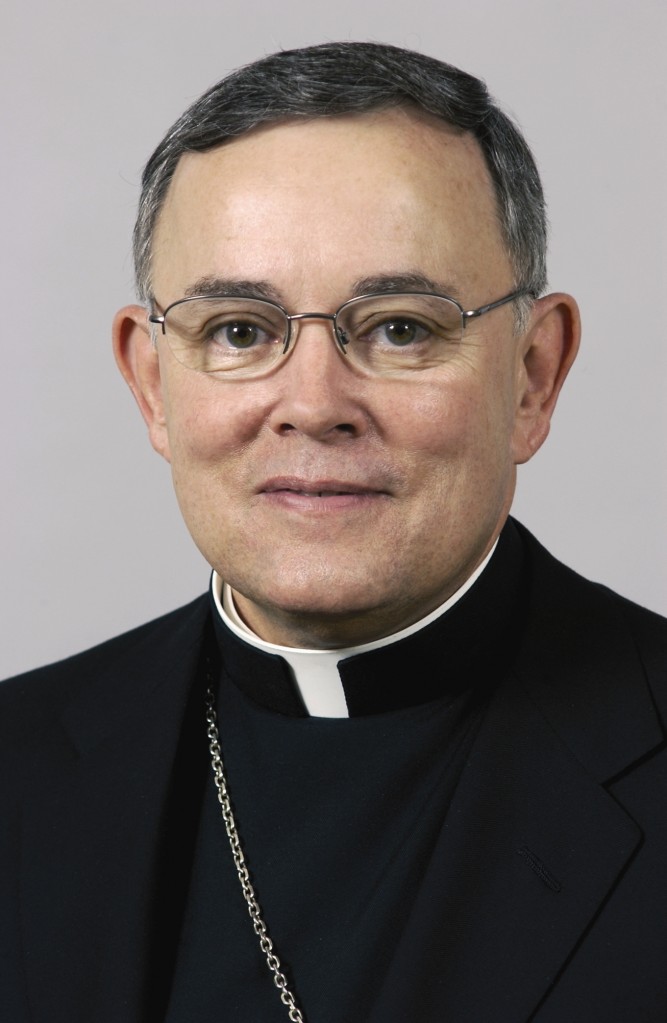 A: I haven’t read the grand jury report yet, and it will be awhile before I fully understand the issues. I need to hear from the people involved in these matters and to learn the facts before I comment.
A: I haven’t read the grand jury report yet, and it will be awhile before I fully understand the issues. I need to hear from the people involved in these matters and to learn the facts before I comment.
I do know that priests’ morale across the country has been seriously wounded by the abuse scandal. I’m sure the priests of Philadelphia carry this burden in their own unique way. But we know that Jesus, when he chooses men to be priests, chooses them with a brother’s love, and I want to be a sign of that love to my brothers. We have to deal with scandal in an honest, thorough, confident way. We can do that, even when it’s very painful, because we know that Christ rose from the dead. “Jesus Christ is risen” — these aren’t just powdered words; they’re a statement of fact. That should give us confidence that what happens in the Church, even when it seems death-dealing, can be turned into a moment of resurrection.
Q: What catches your attention most about the local Church in Philadelphia?
A: I have a lot to learn about Philadelphia, but I’m eager to get started. I did live in western Pennsylvania for 10 years – first as a seminarian, then as a seminary professor, and eventually as a part of the administration of the Capuchin Province of St. Augustine based in Pittsburgh. My time in the state was delightful. I look back on it with great joy. The men and women of Pennsylvania that I’ve met are wonderful people; good, generous and creative. I look forward to being a part of their lives.
Q: You’re a Native American and quite proud of your heritage. Can you talk a little bit about your background, and what that means to you?
A: I’m Native American on my mother’s side. I’m a member of the Prairie Band Potawatomi tribe. Our reservation is in northeastern Kansas.
Being Indian was probably the entry point for my becoming a bishop. One never knows why one becomes a bishop, but my first assignment was the Diocese of Rapid City, South Dakota. I suspect I was sent there was because of my engagement with the Native American Catholic community in the United States. The Holy Father was looking for a way to reach out in special love to the native people. So I see my episcopacy, in some ways, as born from that part of who I am.
The Native American people – the original inhabitants of this land – are a very diverse group with many, many gifts. I’ve always hoped that through my service as a bishop, those gifts can be recognized by the Church all the more, and that the Church can better meet the needs of Native people.
I was blessed to be the first Native American archbishop, and my people were honored by that.
Q: You’re also a Franciscan Capuchin. St. Francis had a pretty radical approach to the Gospel, and the Capuchins were known as reformers within the Franciscan community. How does this shape how you see the Church’s task, and your role as a leader?
A: Francis was radical in the root meaning of the word “radical,” which means to go “to the root” of the matter. He wanted the friars to live the Gospel clearly, without compromise. The word he used was, “without gloss.” It was a custom, in the Middle Ages, to develop commentaries on the Gospel, and sometimes those commentaries would explain away the Christian’s responsibility to live the Gospel without compromise in every moment of our life. Francis rejected any kind of effort to diminish the demands of the Gospel.
Of course, I have to live that discipline personally in my own life. That’s the most important part of my Capuchin identity. But then I have to preach the Gospel in the same kind of way, in a way that’s clear, that’s always fresh, and always without compromise.
Before anything else, we’re called to be Catholics. That should be the defining part of who we are. Whether we’re Indians or Germans or Irish; whether we’re Democrats or Republicans, we are Catholic first. Everything else is secondary. Francis called his brothers not only to live that Catholic identity personally, but to preach that unvarnished Gospel with clarity. And I hope that my service as a bishop always enables me to do that.
Q: You’ve talked about this issue of Catholic identity frequently. Why is that so important to you? Is there something about American culture that encourages people to compartmentalize their faith from the rest of their lives?
A: Many of the dominant themes of our time work contrary to the Gospel. All of us who are Catholics are very much influenced by our culture and by our society’s criticism of the Gospel. Because of these pressures, Catholics are often tempted to be embarrassed by their faith, and to make decisions that are compromised by our desire to somehow please the world, while satisfying God. We often can’t do both. We always need to choose to please God first.
We need the support of the Church, the help of our brothers and sisters in faith, to live the Gospel in this difficult environment. That’s why I’ve spent so much time in these last years, as a bishop, writing and speaking about this. I want the Church to have confidence in the Gospel and Christians to support one another, regardless of the opposition to the Gospel in our culture.
We owe it to our country and the age we live in, to be faithful Catholics. If we’re good Catholics first, then we’re good citizens, and if we’re good citizens, then we’ll be a force of transformation for justice in the world. If we don’t live as faithful Catholics, we betray the Gospel. We forfeit the opportunity God gives us to make a significant difference for the evangelization of culture.
Q: Many Catholics now serve in Congress, in state houses, in governors’ mansions — we even find Catholics as a majority on the Supreme Court. But we often don’t see the content of Christian social teaching reflected in society. Does this relate to that issue of Catholic identity?
A: There’s an obvious temptation, in political life, to compromise Christian virtues and values because of the pressures of the society around us. But I wouldn’t first point to governors, or congressional representatives, or Supreme Court justices. I’d point to ourselves. If our political leaders lack conviction about their faith, it’s because the members of the Church lack conviction about their faith. Political leaders are no different from the rest of us. So if we point fingers at them, we’re also pointing fingers at ourselves, and at the broader Church community.
So the Gospel should be preached, first of all, in the Church. Naturally, we need to preach it to political leaders as well. But they’re not alone – not by a long shot — in their tepidity and compromises of the Gospel. If Catholics in their homes and parishes understand that, they’ll realize that a serious conversion needs to take place in all our lives, and not just in the lives of politicians.
Q: If this applies to every member of the Church, how do you think it applies to bishops? What do you think is the role of a bishop in American society?
A: A bishop, before he’s a bishop, is a Christian. And before he’s ordained, he’s baptized. So I think that anything that we say about Christians, we have to say about bishops, too. And bishops, because they’re raised up to be a sign of the presence of Christ in the Church, need to live the Gospel more clearly and more authentically, without compromise, than anyone else.
We can’t preach to others what we don’t embrace ourselves. And because we sometimes don’t practice these things ourselves, sometimes we’re embarrassed to preach these things to others. This is also why those who are called to preach the Gospel might sometimes be silent.
So I think that bishops always have to be engaged in the process of their own personal conversion – prior to calling others to conversion. At the same time, we can’t let our sins and our failures cripple us; otherwise the Apostles themselves would have stayed silent. We have to practice what we preach. But even if we don’t, we always have to preach the Gospel. And if we preach it to others, conscious that we need to be converted ourselves, then things really will begin to change.
Q: From your perspective as a bishop, where are we as a Church, and as a nation, on the issue of abortion?
A: I think that our country, in some special sense, is going to be judged by God on that issue. If we’re not able to protect the most vulnerable members of our society, then we aren’t living up to the public commitment we have as a nation to protect the life, liberty, and happiness of every individual. The unborn child certainly shares with us our human dignity, and has a right to those protections. That’s why I believe this remains one of the fundamental issues of our time. We can’t be a people of justice if we don’t protect the life of the unborn child.
This is, of course, just one of the pressing issues of our time. Also vitally important is the question of the meaning of marriage. Family life is the foundation stone of all community. It’s the first community that we’re born into. The health of our families will lead to the stability or weakening of our society.
The Church’s efforts today, to protect the traditional meaning of marriage, are on behalf of stable family life, for the sake of children. Marriage is a relationship of a man and a woman, in a stable and faithful way, for the sake of children. The most important thing for our development into mature adults is that we know that our fathers love our mothers and our mothers love our fathers. If we don’t know that, then a certain kind of instability enters our lives. Anything we do, as a country, to undermine that meaning of marriage, creates a danger – a clear danger – to the long-term health of our country.
Q: The fact that civil laws favoring so-called gay “marriage” have been approved in several places, in the last two years, has led some people to say that the Church, and especially the bishops, have “lost the argument” in the American culture. How do you think individual Catholics should approach this issue in their communities? And what is the right role of the institutional church and the bishops?
A: We only lose when we stop working and struggling for what we believe to be true. In a very general sense, the battle was “lost” the day after Golgotha. Except the disciples didn’t get the memo.
I don’t think we’ve lost the marriage issue at all. Even framing the question that way shapes the answer in a wrong direction, because the language of a debate conditions how we think. If we concede the language, we concede the issue. I do think we’ve been allowing ourselves to lose the marriage debate for years, rooted in our confusion about individual and community rights, and our fear of being portrayed as “against” other people. Catholic teaching on sexuality and marriage is for human dignity; it is for human happiness and the virtuous development of family and society. It is “against” only those behaviors that undermine those goals. When people try to frame Catholic belief as an intrinsic hostility for individual persons or groups, they are not being honest.
Cohabitation today without marriage is quite common, with children being born outside the context of married love, and many people are confused about what marriage really means. Generally, people think “marriage” means a loving relationship between two people that has a sexual component. But that’s not what marriage means. It means a specific kind of loving relationship, for the sake of children. And the more we’re confused about that, the more damage we do to ourselves. So we need to have confidence in our faith and keep fighting this fight with a spirit of serenity. The Gospel is true, and the Church is right about the purpose of human sexuality, whether our critics like the message or not. So much is at stake –not just the moral teaching of the Church, but the health of our communities and our country. If we love our country, that means we fight for the things that protect our country and make it strong.
Q: Four years ago you wrote a book on Catholic political and social engagement, “Render Unto Caesar.” If you had to write that book today, would it have a different accent? In other words, what issues look most important to you today for Catholic political involvement in the United States, and in general, Catholic involvement in the public square?
A: When I wrote that book, four years ago, I was responding to a request from a friend – a young husband and father — who had run for state office, but found it troubling because of the pressure in party politics to embrace issues contrary to Catholic belief. I wanted to engage Catholics in a reflection on their responsibility for our country, and how politics can never be separated from faith even though “separation of Church and state,” properly understood, is a principle that’s worked well in our country. My point is that separation of Church and state was never intended to mean that we separate our faith from our social, economic and political life.
I have a high regard for the book’s publisher, and we’ve talked about doing an updated edition of “Render Unto Caesar.” Since my appointment to Philadelphia, I’ve had a certain kind of enthusiasm for a new version. So, give me some time, and you never know. Maybe I’ll have some additional thoughts on faith and public in the 21st century.
Black and Pro-Life – Awesome Video!
July 1, 2011 by admin
Filed under Blog, cultural manliness, Faith, Fatherhood, manliness, Virtue
 I just saw this awesome video from the National Black Pro-Life Coalition (BlackandProLife.org). Take 60 seconds and watch it. It is true and profound. Just because I am not black does not mean that I cannot stand up against this blatant racism and extermination of my fellow Americans. Let our voice be heard, ABORTION MUST STOP!
I just saw this awesome video from the National Black Pro-Life Coalition (BlackandProLife.org). Take 60 seconds and watch it. It is true and profound. Just because I am not black does not mean that I cannot stand up against this blatant racism and extermination of my fellow Americans. Let our voice be heard, ABORTION MUST STOP!
Black men – I want to direct your attention to something. You can play a vital role in the end to abortion! Your role may be THE most important. The statistics do not lie. Stand up for women and children and fight to stop abortion now!
TrueMan up!
Catholic Eucharistic Flash Mob
 Did you see this? A Eucharistic “Flash Mob” put on by some Franciscan brothers and volunteers on
Did you see this? A Eucharistic “Flash Mob” put on by some Franciscan brothers and volunteers on 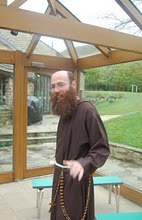 Ascension Thursday.
Ascension Thursday.
Very courageous and SO NEEDED!
Let us not be afraid, let us not cower, let us not be afraid of theculture. Jesus is the way, the truth and the life!
Thank you to Brother Paul, Brother Loarne and to those who courageously stepped up and stood strong for the Truth!
TrueMan up!

